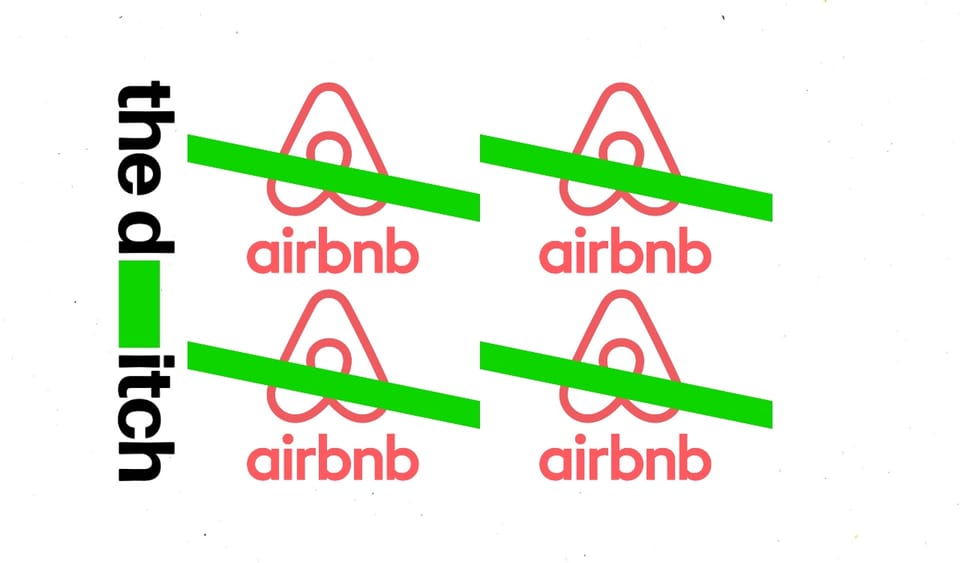To truly understand Airbnb expansionism in Ireland look to the Gaeltacht. Since 2019 there’s been an 88 percent increase in the number of entire homes to rent in Gaeltacht areas on Airbnb compared with a 48 percent rise nationally. These areas, some along the Atlantic coast, are among the most deprived in the country but also the most aspirational destinations for holidays and second homes.
They also, says Conradh na Gaeilge advocacy manager Róisín Ní Chinnéide, have a “whole extra responsibility they never asked for thrust upon them”. It’s the responsibility, increasingly hard to shoulder during a state-driven housing crisis, “of being the last handful of areas in the country where the Irish language remains a community language”.
Conradh na Gaeilge and the Community Action Tenants Union (CATU) have worked with Inside Airbnb to identify the scale of the tech company’s encroachment on the Gaeltacht. Where once Airbnb and its advocates claimed it’s a platform for making travel easier or getting pocket money for your spare room, today in Ireland the five largest Airbnb Gaeltacht landlords let 217 properties between them.
All but one – 25 of the 26 – Gaeltacht planning areas have recorded significant increases in the number of entire homes listed on Airbnb during the period Inside Airbnb collected its information, from May 2019 till September this year. And though Airbnb’s influence on the housing market – and therefore politically – has grown across the country, its rise in the Gaeltacht is particularly political.
“Gaeltachts are communities that despite 800 years of colonisation and economic marginalisation managed to keep the language alive. They have this incredible history of resilience and radical activism. That changed entirely the fabric of the Irish language community. That's where TG4 came from. That's where Raidió na Gaeltachta came from. All of these services that I grew up with came from this group of radical Irish language activists who were sick of the way that they were being treated by the state,” says Conradh na Gaeilge’s Ní Chinnéide.
“This history of the Gaeltachts as places of radical and forward thinking gets forgotten now when they've become a holiday destination. And to a certain extent tourism is important to these areas. But tourism existed long before the likes of Airbnb and it will exist afterwards as well,” she says.
The Gaeltacht’s biggest Airbnb landlord is British company Sykes Holiday Cottages. Established in 2002 and based in Chester, it has 276 live listings on Airbnb, with 53 in the Gaeltacht. Experience Dingle, the second-largest Airbnb Gaeltacht landlord, has 49. Trident Holiday Homes and Shamrock Cottages have 27 and 17 while there are sole operators with 46 and 10 listings each in the top 10 Airbnb Gaeltacht landlords.
'You essentially just can't rent in the Gaeltacht'
In Ní Chinnéide’s work with Conradh na Gaeilge she’s seen how state neglect in housing has intersected with its failures to support the Gaeltacht and people who live there.
“Housing is one of the main issues that all of these communities are facing. And so over the last three years, housing has become, even though it's not supposed to be, the main focus of my work because it's impacting the communities that I'm working with and advocating for. You essentially just can't rent in the Gaeltacht. And then the other issue is affordability. This comes back to the number of holiday homes and second homes in these areas. And when properties come on the market, they're extortionate,” she says.
“It's particularly bad since Covid when there was an influx of people working remotely or people who maybe were previously based in Dublin and now can do their fancy tech job from a nice house in Connemara. They couldn't have done that previously. So local people are in competition with someone who's trying to buy maybe their second or third home. They’re priced out,” she says.
According to Inside Airbnb’s research, in almost 20 percent of Gaeltacht language planning areas across the country, Airbnb listings for entire homes outnumber long-term lets from private landlords. More than 16 percent of all private properties in the Kerry Gaeltacht are whole homes on Airbnb.
The Ditch has previously reported on the failures (or refusals) of Ireland’s Airbnb landlords to seek the planning permission, required in some instances, to list their properties on the site. The state has taken little action on these failures and continues to delay a register of short-term rentals. It’s likely it won’t introduce this register till next summer. This failure to act, says Ní Chinnéide, isn’t accidental.
“It serves their interests, this policy of privatisation and the commodification of housing. Look at the amount of money spent on the housing assistance payment” – which goes to private landlords – as well as “the cuts that public investment in housing suffered after the crash.”
“Your home is an essential part of who you are and is the very epicentre of an ecosystem of rights,” she says, the protection of which “has been entirely absent from government policy. And that goes hand in hand with the economic and social marginalisation of the Gaeltacht and the historic underfunding of the Irish language.”
'They're also profiting off a genocidal apartheid state'
Airbnb is not just a target for housing activists, but also, because it facilitates property rentals on illegally occupied Palestinian land, for the Palestine solidarity movement. Last month the Irish High Court ruled the guards are to review their decision not to investigate a criminal complaint about these listings. Responding to the High Court ruling, Sadaka chairperson Éamonn Meehan said, “To exclude activities such as those carried out by Airbnb would be a flagrant breach of Ireland’s international law obligations to ban trade with the settlements.” Ní Chinnéide connects Airbnb’s operations in illegal settlements, where it has hundreds of properties listed, with its affairs in the Gaeltacht.
“They're not only impacting our communities here at home, but they're also profiting off a genocidal apartheid state. There are so many parallels between the colonisation of Ireland and what is happening in Palestine. It's only right that we would take all of that into account when we're looking at this – you can't look at the Irish language in isolation. If we want to fight back against this we need to be taking account of all of the broader context,” she says.
Over the six year period that Inside Airbnb – with Conradh na Gaeilge and CATU – has tracked Airbnb listings in the Gaeltacht, areas in Donegal recorded a 98 percent increase in entire homes listed on the site; Waterford’s increase was 83 percent; it was 93 percent for Bearna in Galway. As Ní Chinnéide said the Gaeltacht has had to bear the burden of keeping Irish alive. It’s a deeply political burden – and the state has only added to its weight.
“If you want to live your life through Irish the language cannot be apolitical. The language is so important to our identity and what it means to be Irish. But it also exists in the current day and is both impacted by and impacts other social issues. That’s come to light in the question of housing in particular. People realise this is having a specific impact on our community. It’s ridiculous to think that the language could be or ever was apolitical – it's inherently political,” she says.


